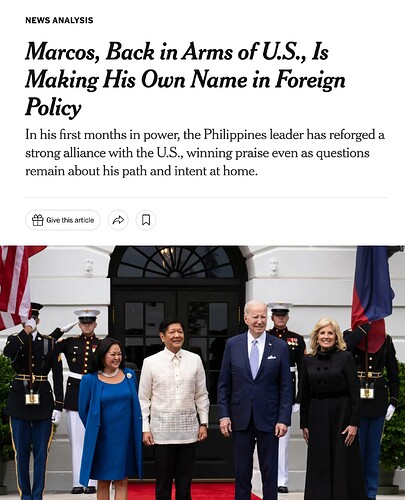-
小费迪南德-马科斯去年在竞选菲律宾总统时提出了在中国和美国之间走钢丝的外交政策。周一,他受到拜登总统的欢迎来到白宫,并被誉为最高盟友。
-
自6月就职以来,马科斯在与中国日益激烈的竞争中设计了一个强有力的向美国的支点。他欢迎美国高层官员来访,并宣布美国将获得进入菲律宾另外四个军事基地的权利。上个月,菲律宾举办了两国之间有史以来最大规模的联合军事演习。
-
新加坡ISEAS-Yusof Ishak研究所的访问学者Aries Arugay对马科斯外交政策的步伐和速度感到惊讶。他认为马科斯在外交政策方面给出了正确的提示。
-
自当选以来,菲律宾总统小费迪南德-马科斯已经进行了10次国际访问,以拉动投资,尽管反对派质疑其作用。他的政府希望恢复马科斯家族的声誉和荣耀,而他的新人气也使他成为一个两极化的人物。他在夏威夷面临着一项尚未执行的藐视法庭令,因为他拒绝透露其家族财富的藏匿地点。
-
当马科斯先生当选时,白宫印度洋-太平洋地区协调员说,"历史因素 "可能对拜登政府与他的接触构成 “挑战”。他被指责为赢得选举而发动了一场造谣运动,人权活动家说他没有采取任何措施来解决他父亲和他的前任罗德里戈-杜特尔特的侵权行为。
-
对于关注菲律宾政治的人来说,马科斯先生和拜登先生之间的会面是超现实的。南加州大学的菲律宾作家和历史学家阿德里安-德-莱昂(Adrian De Leon)说,他认为这特别令人不安,“历史不仅被遗忘,而且被积极地切除了脑叶。”
-
1986年,当时的参议员乔-拜登批评罗纳德-里根总统对老马科斯的 “摇摆不定的声明”,后者实行了长达14年的戒严,导致成千上万的人被逮捕和遭受酷刑。拜登指出,美国在菲律宾既有重要的军事设施,也有对民主生存的承诺,两者是不可分割的。众议员苏珊-怀尔德提出了因人权问题而暂停军事援助的立法。
-
马科斯先生是老马科斯的儿子,他很早就从父亲那里领略到了政治的魅力,见过毛泽东和邓小平,还有弗朗西斯科-佛朗哥将军。他是亲西方的,曾就读于英国牛津大学,喜欢看一级方程式赛车,喜欢摇滚乐,喜欢为家人做饭。由于有可能入狱,他已经15年没有来过美国。
-
对马科斯家族发起集体诉讼的律师罗伯特-斯威夫特正在等待纽约法院对可能重新分配属于老马科斯的4000万美元资金的判决。斯威夫特认为,美国政府可以对人权受害者做得更好,但他们会支持友好的独裁者而不加以干涉。
-
Ferdinand Marcos Jr. campaigned for the Philippine presidency last year with a foreign policy of walking the tightrope between China and the United States. On Monday, he was welcomed to the White House by President Biden and hailed as a top ally.
-
Since his inauguration in June, Marcos has engineered a forceful pivot towards the United States in its intensifying rivalry with China. He has welcomed visits by top-level American officials, and announced that the United States would gain access to four more military sites in the Philippines. Last month, the Philippines hosted the biggest-ever joint military drills between the two countries.
-
Aries Arugay, a visiting fellow at the ISEAS-Yusof Ishak Institute in Singapore, was surprised by the pace and acceleration of Marcos’ foreign policy. He believes Marcos is giving the right cues on the foreign policy front.
-
Since his election, Filipino President Ferdinand Marcos Jr. has made 10 international trips to drum up investments, although the opposition has questioned their usefulness. His administration wants to restore the reputation and glory of the Marcos family, and his new popularity has made him a polarizing figure. He faces an outstanding contempt of court order in Hawaii for refusing to disclose where his family’s wealth is hidden.
-
When Mr. Marcos was elected, the White House coordinator for the Indo-Pacific said that “historical considerations” could pose “challenges” to the Biden administration’s engagement with him. He is accused of waging a disinformation campaign to win the election and human rights activists say he has done nothing to address the abuses committed by his father and his predecessor, Rodrigo Duterte.
-
For those paying attention to Philippine politics, the meeting between Mr. Marcos and Mr. Biden was surreal. Adrian De Leon, a Filipino writer and historian at the University of Southern California, said he found it particularly disturbing “the swiftness with which, history is not just forgotten, but actively lobotomized.”
-
In 1986, then-Senator Joe Biden criticized President Ronald Reagan’s “waffling statements” on the elder Marcos, who had imposed a 14-year period of martial law resulting in the arrests and torture of thousands. Biden noted that the U.S. had both important military installations in the Philippines and a commitment to the survival of democracy, which were inseparable. Representative Susan Wild has proposed legislation to suspend military aid due to human rights concerns.
-
Mr. Marcos, the son of the elder Marcos, got an early taste of politics from his father, meeting Mao Zedong and Deng Xiaoping, and General Francisco Franco. He is pro-Western, having gone to Oxford University in England, and enjoys watching Formula 1, rock music, and cooking for his family. He had not been in the U.S. for 15 years due to the potential of jail time.
-
Robert Swift, the lawyer who launched the class action suit against the Marcoses, is awaiting a verdict from a New York court on a possible redistribution of $40 million of funds belonging to the elder Marcos. Swift believes the U.S. government can do better by human rights victims but that they will support friendly dictators without interfering.
